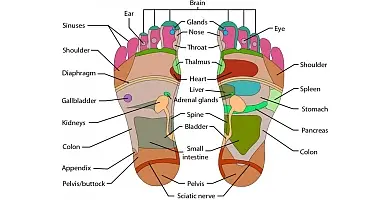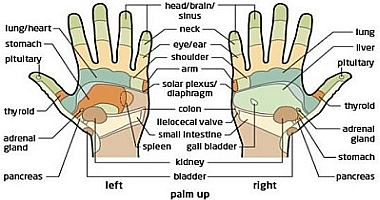Reflexology is a therapeutic practice that involves the deliberate and precise application of pressure to specific points on the feet, hands, or ears. This technique uses targeted movements with the thumbs, fingers, and hands to stimulate these areas, promoting relaxation, improving circulation, and supporting overall health and well-being. By focusing on these reflex points, reflexologists aim to influence corresponding organs and systems within the body, encouraging natural healing processes.
-
-
Theory:The belief is that stimulating reflex points on the extremities can affect and balance the corresponding organs, glands, and other body structures.
-
-
Technique:A reflexologist uses thumb, finger, and hand techniques to apply gentle pressure to these points.
-
Energy flow:One theory suggests that reflexology helps restore the flow of energy (chi) through the body, reducing stress and promoting overall balance.
-
Nerve connections:Another theory points to the fact that internal organs are connected to the skin via nerves, which may explain why pressure on the feet can have a systemic effect.
-
Healing power of touch:For some, the benefits may be due to the calming effects of touch and the release of the body’s natural pain-relieving chemicals.


- Session: A reflexology session typically involves working on the feet, though hands and ears are sometimes included.
- Clothing: Clients usually remain fully clothed, removing only their footwear.
- Duration: Sessions can vary in length, from 30 minutes to an hour or longer.
- Technique: The practitioner uses specific movements, such as pressing, sliding, and compression, on the reflex points.
- After effects: Some people may experience a “healing crisis,” a temporary detoxification reaction, especially if the body is more toxic.
- Relaxation: Helps promote deep relaxation and a general sense of wellbeing.
- Stress reduction: Can be effective in reducing stress and anxiety.
- Improved sleep: May help improve sleep quality for some individuals.
- Pain relief: Some studies suggest it can help with pain and fatigue, and may stimulate the release of the body’s own pain-relieving chemicals.
- Supportive therapy: Can offer supportive touch and one-on-one attention.
- Safety: It is considered a low-risk therapy with no known serious side effects.
- Caution: It should be used with caution if you have certain foot conditions, such as gout, skin ulcers, vascular disease, or arthritis.
- Consultation: It is always best to consult a qualified reflexologist and your doctor, especially if you have an existing health condition.
